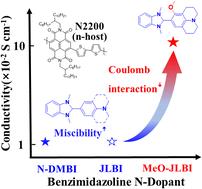当前位置:
X-MOL 学术
›
J. Mater. Chem. A
›
论文详情
Our official English website, www.x-mol.net, welcomes your
feedback! (Note: you will need to create a separate account there.)
N-doped semiconductive polymer using methoxy-modified JLBI for optimized miscibility and Coulomb interactions towards high thermoelectric performance
Journal of Materials Chemistry A ( IF 10.7 ) Pub Date : 2024-12-20 , DOI: 10.1039/d4ta07144a
Dingchang Su 1 , Chun Zhan 1 , Yang Xiang 1 , Wei Wang 1 , Chenglong Li 1 , Qisheng Zhou 1 , Defu Dong 1 , Shengqiang Xiao 1
Journal of Materials Chemistry A ( IF 10.7 ) Pub Date : 2024-12-20 , DOI: 10.1039/d4ta07144a
Dingchang Su 1 , Chun Zhan 1 , Yang Xiang 1 , Wei Wang 1 , Chenglong Li 1 , Qisheng Zhou 1 , Defu Dong 1 , Shengqiang Xiao 1
Affiliation

|
Molecular doping of n-type polymers generates coulombically bound charge carriers or counterion pairs via a charge-transfer process. Synergistically optimizing the miscibility and the release of free charge carriers within a specific polymer:n-dopant pair poses a formidable challenge for achieving high-performance n-type organic thermoelectrics. In this work, the density of free charge carriers and thermoelectric properties were significantly enhanced in the n-doped benchmark semiconductive polymer N2200 by harnessing a novel n-dopant, 9-(1,3-dimethyl-2,3-dihydro-1H-benzo[d]imidazol-2-yl)-8-methoxy-julolidine (MeO-JLBI), which was derived from our previously reported JLBI molecule by employing the lipophilicity of julolidine group and the electron-donating characteristic of MeO group. In contrast to N2200 films doped with the common benzimidazoline n-dopants N-DMBI and JLBI, which showed similar low performance, the MeO-JLBI-doped N2200 exhibited ∼4 times higher free charge carrier density and ∼10 times higher conductivity (1.02 × 10−2 S cm−1), leading to a ∼5 times higher room-temperature power factor of 3.54 × 10−2 μW m−1 K−2 at optimized conditions, which represented one of the highest power factors observed for doped N2200 films to date. Experimental findings demonstrated that the MeO group enhanced the driving force for charge transfer, reduced the Coulomb interactions between counterion pairs in the doped state, and consequently facilitated the generation of free charges more efficiently, while maintaining the same enhanced miscibility with N2200 as observed with JLBI. This study offers an approach that synergistically utilizes electron-donating and lipophilic effects to tackle the key requirements of high miscibility, charge transfer driving force, and reduced Coulomb interactions in n-doped polymers for thermoelectric applications.
中文翻译:

使用甲氧基改性 JLBI 的 N 掺杂半导体聚合物,优化混溶性和库仑相互作用,实现高热电性能
n 型聚合物的分子掺杂通过电荷转移过程产生库仑结合的电荷载流子或反离子对。协同优化特定聚合物:n 掺杂剂对中的混溶性和自由电流流子的释放,对实现高性能 n 型有机热电技术构成了艰巨的挑战。在这项工作中,通过利用一种新型 n 掺杂剂 9-(1,3-二甲基-2,3-二氢-1H-苯并[d]咪唑-2-基)-8-甲氧基-朱利定 (MeO-JLBI) (MeO-JLBI),我们之前报道的 JLBI 衍生出 n 掺杂基准半导体聚合物 N2200 中自由电荷载流子的密度和热电性能分子通过利用 julolidine 基团的亲脂性和 MeO 基团的供电子特性。与掺杂普通苯并咪唑啉 n 掺杂剂 N-DMBI 和 JLBI 的 N2200 薄膜相比,它们表现出类似的低性能,而掺杂 MeO-JLBI 的 N2200 表现出 ∼4 倍的自由电荷载流子密度和 ∼10 倍的电导率 (1.02 × 10-2 S cm-1),导致室温功率因数高出 ∼5 倍,为 3.54 × 10-2 μW m-1K-2 的 K-2 值,这是迄今为止观察到的掺杂 N2200 薄膜的最高功率因数之一。 实验结果表明,MeO 组增强了电荷转移的驱动力,减少了掺杂状态下对子对之间的库仑相互作用,从而更有效地促进了自由电荷的产生,同时保持了与 JLBI 观察到的与 N2200 相同的增强混溶性.本研究提供了一种协同利用电子供体和亲脂效应来解决热电应用中 n 掺杂聚合物中高混溶性、电荷转移驱动力和减少库仑相互作用的关键要求的方法。
更新日期:2024-12-20
中文翻译:

使用甲氧基改性 JLBI 的 N 掺杂半导体聚合物,优化混溶性和库仑相互作用,实现高热电性能
n 型聚合物的分子掺杂通过电荷转移过程产生库仑结合的电荷载流子或反离子对。协同优化特定聚合物:n 掺杂剂对中的混溶性和自由电流流子的释放,对实现高性能 n 型有机热电技术构成了艰巨的挑战。在这项工作中,通过利用一种新型 n 掺杂剂 9-(1,3-二甲基-2,3-二氢-1H-苯并[d]咪唑-2-基)-8-甲氧基-朱利定 (MeO-JLBI) (MeO-JLBI),我们之前报道的 JLBI 衍生出 n 掺杂基准半导体聚合物 N2200 中自由电荷载流子的密度和热电性能分子通过利用 julolidine 基团的亲脂性和 MeO 基团的供电子特性。与掺杂普通苯并咪唑啉 n 掺杂剂 N-DMBI 和 JLBI 的 N2200 薄膜相比,它们表现出类似的低性能,而掺杂 MeO-JLBI 的 N2200 表现出 ∼4 倍的自由电荷载流子密度和 ∼10 倍的电导率 (1.02 × 10-2 S cm-1),导致室温功率因数高出 ∼5 倍,为 3.54 × 10-2 μW m-1K-2 的 K-2 值,这是迄今为止观察到的掺杂 N2200 薄膜的最高功率因数之一。 实验结果表明,MeO 组增强了电荷转移的驱动力,减少了掺杂状态下对子对之间的库仑相互作用,从而更有效地促进了自由电荷的产生,同时保持了与 JLBI 观察到的与 N2200 相同的增强混溶性.本研究提供了一种协同利用电子供体和亲脂效应来解决热电应用中 n 掺杂聚合物中高混溶性、电荷转移驱动力和减少库仑相互作用的关键要求的方法。

































 京公网安备 11010802027423号
京公网安备 11010802027423号